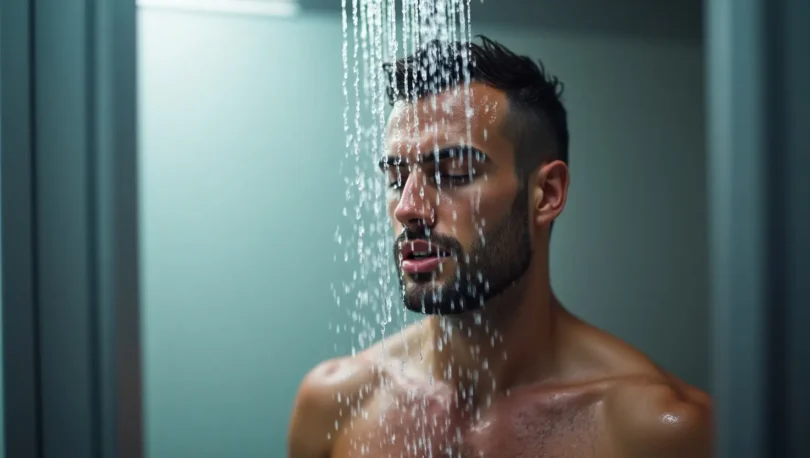The 30-day cold showers challenge is more than just a test of willpower—it’s a science-backed habit that can transform your mind, body, and overall well-being. From increased circulation to a surge in dopamine levels, cold showers offer a natural way to improve physical health, mental focus, and emotional stability.
Imagine stepping into icy cold water first thing in the morning. Your body tenses, your breath catches, and every instinct tells you to jump out. Yet, thousands of people swear by this daily ritual, claiming it boosts energy, strengthens resilience, and enhances mental clarity.
But let’s be real: committing to 30 days of cold showers isn’t easy. That’s why in this guide, we’ll break down everything you need to know—including the science behind cold therapy, the benefits you can expect, and practical strategies to make it through the challenge.
Whether you’re looking to build mental toughness, boost energy, or simply try something new, this challenge could be the game-changer you need. Ready to take the plunge? Let’s dive in.
Headlines
The Science Behind Cold Showers
Mental & Emotional Benefits of 30 Days of Cold Showers
How to Start & Stick to the 30-Day Cold Shower Challenge
The Science Behind Cold Showers
1.1 How Cold Showers Affect Your Body
Cold showers may seem like a simple habit, but their effects on the body are profound. From activating thermogenesis to boosting circulation, cold water immersion has a direct impact on physiological functions. Let’s break down the science behind it.
Cold Water Immersion & Thermogenesis
One of the most fascinating effects of cold showers is their ability to trigger thermogenesis—a process where your body generates heat to maintain its core temperature. This happens due to the activation of brown adipose tissue (brown fat), a type of fat that burns calories to produce heat.
- Brown fat activation: Unlike white fat, which stores energy, brown fat burns calories to keep you warm. When exposed to cold temperatures, your body increases brown fat activity, potentially aiding in weight management and metabolism boost.
- Energy expenditure: Studies suggest that regular exposure to cold temperatures may enhance calorie burning and could contribute to fat loss over time.
Vasoconstriction & Circulation Improvement
Cold showers also have a profound impact on blood circulation, which plays a key role in cardiovascular health and muscle recovery.
- Vasoconstriction (narrowing of blood vessels): When cold water hits the skin, the body responds by constricting blood vessels, which helps redirect blood flow to vital organs. This can improve heart health and increase oxygen delivery throughout the body.
- Improved circulation post-shower: After stepping out of a cold shower, your blood vessels dilate (vasodilation), leading to improved circulation. This process can help reduce muscle soreness, speed up recovery after workouts, and even improve skin tone by promoting better oxygenation of tissues.
- Immune system boost: Regular cold exposure has been linked to increased production of white blood cells, strengthening the body’s ability to fight off infections and illnesses.
Additional Benefits of Cold Showers on the Body
- Reduces inflammation: Athletes use cold water immersion to soothe muscle pain and reduce inflammation after intense exercise.
- Enhances skin and hair health: Cold water tightens pores, reduces oil production, and prevents dryness, leading to healthier skin and shinier hair.
- Regulates body temperature: Over time, cold exposure helps the body adapt to temperature changes, improving cold tolerance and resilience.
1.2 Psychological & Neurological Effects of Cold Showers
Cold showers don’t just shock your body—they also rewire your brain. The exposure to cold water triggers a series of neurological responses that can improve mood, enhance mental clarity, and reduce stress levels. Let’s explore the psychological and neurological impact of cold exposure.
Dopamine Boost & Mood Enhancement
One of the most immediate effects of a cold shower is the surge of dopamine, a neurotransmitter associated with motivation, pleasure, and focus.
- Cold exposure stimulates the release of dopamine, increasing levels by up to 250%, similar to the effects of some antidepressants.
- Boosts mood and combats depression: Studies suggest that exposure to cold water can help alleviate symptoms of depression and anxiety by activating the sympathetic nervous system and increasing levels of endorphins (“feel-good hormones”).
- Increases alertness and focus: The shock effect of cold water triggers a heightened state of awareness, making it an excellent tool for morning energy boosts.
🔹 Real-world example: The Wim Hof Method, which combines cold exposure with breathing exercises, has been linked to increased dopamine and serotonin production, reducing stress and enhancing resilience.
Cortisol Regulation & Stress Resilience
Cold showers play a crucial role in stress management and resilience-building. The body perceives cold water as a mild stressor, triggering the fight-or-flight response, which over time, trains your body to handle real-life stress more effectively.
- Regulates cortisol levels: Cortisol is the primary stress hormone responsible for the “fight-or-flight” response. Cold showers help stabilize cortisol production, leading to lower baseline stress levels.
- Strengthens the nervous system: The repeated exposure to cold stress helps the autonomic nervous system adapt, making you less reactive to emotional and physical stressors in daily life.
- Enhances resilience: Over time, individuals who take regular cold showers experience higher mental toughness and emotional control.
🔹 Real-world application: Many high-performance athletes, entrepreneurs, and military personnel incorporate cold showers into their routine to develop mental resilience and discipline.
Additional Neurological Benefits of Cold Showers
- Improves sleep quality: While cold showers boost alertness in the morning, they can also help with sleep regulation when taken in the evening by lowering core body temperature.
- Enhances brain function: By stimulating norepinephrine production, cold showers may improve memory, attention span, and overall cognitive function.
- Reduces symptoms of burnout: Those experiencing mental fatigue or chronic stress may find relief through cold water therapy, as it helps reset the nervous system.
Mental & Emotional Benefits of 30 Days of Cold Showers
2.1 Physical Health Benefits of Taking Cold Showers for 30 Days
Cold showers may feel like a shock to the system at first, but after 30 days of consistent exposure, your body adapts in incredible ways. From boosting immunity to enhancing recovery and skin health, the physical benefits of this habit go beyond just waking you up.
1. Immune System Boost: Strengthening Your Body’s Defenses
One of the most well-documented benefits of cold showers is their ability to strengthen the immune system. Cold exposure stimulates the production of white blood cells, which play a critical role in fighting infections and diseases.
- Increases white blood cell production: Regular cold showers enhance the activity of lymphocytes and monocytes, two types of white blood cells responsible for immune defense.
- Boosts antioxidant levels: Exposure to cold water triggers an increase in glutathione production, a powerful antioxidant that helps reduce oxidative stress.
- Reduces susceptibility to colds and flu: A study published in the journal PLOS One found that people who regularly take cold showers are 29% less likely to call in sick compared to those who don’t.
🔹 Pro tip: If you’re prone to seasonal illnesses, incorporating cold showers into your routine could help strengthen your natural defense system.
Cold Showers & Immune System – Harvard Health: The Benefits of Cold Exposure
2. Skin and Hair Health: Natural Glow and Strength
Unlike hot showers, which strip away natural oils, cold showers help retain moisture, leaving your skin and hair healthier.
- Tighter pores and reduced acne: Cold water shrinks pores, reducing excess oil production and minimizing breakouts and acne.
- Prevents dry skin: Unlike hot water, which dehydrates the skin, cold showers help maintain natural hydration and reduce itchiness and irritation.
- Stronger, shinier hair: Cold water seals the hair cuticles, locking in moisture and preventing frizz and breakage.
🔹 Fun fact: Many beauty experts recommend rinsing hair with cold water after shampooing to promote healthy hair growth.
3. Faster Muscle Recovery and Reduced Inflammation
Cold exposure has long been used by athletes and fitness enthusiasts to speed up muscle recovery and reduce inflammation.
- Eases muscle soreness: Cold showers reduce lactic acid buildup, which helps prevent post-workout soreness.
- Decreases inflammation: Similar to ice baths, cold showers can help reduce swelling and promote faster healing after intense physical activity.
- Increases blood circulation: Cold water stimulates vasoconstriction, which redirects blood flow to the core and flushes out metabolic waste from tired muscles.
🔹 Pro tip: If you engage in intense workouts, taking a cold shower after exercise can help enhance recovery and reduce muscle stiffness.
4. Enhances Cardiovascular Health
Cold showers train your circulatory system by forcing blood vessels to contract and expand, improving overall heart health and blood flow.
- Lowers blood pressure: Cold water stimulates vasoconstriction, which improves circulation and may contribute to better cardiovascular function.
- Increases oxygen delivery: Improved circulation helps deliver more oxygen and nutrients to tissues and organs, leading to better overall health.
- May reduce risk of heart disease: Regular exposure to cold water has been linked to stronger cardiovascular resilience over time.
🔹 Scientific insight: Research suggests that exposure to cold water immersion activates the parasympathetic nervous system, helping regulate heart rate variability, a key indicator of heart health.
5. Supports Weight Loss Through Brown Fat Activation
Cold showers help stimulate brown adipose tissue (BAT), a special type of fat that burns calories to generate heat.
- Activates thermogenesis: Brown fat activation increases energy expenditure, helping the body burn calories more efficiently.
- Aids in weight management: Some studies suggest that individuals exposed to cold temperatures over time experience a reduction in white fat, which is the type of fat responsible for weight gain.
- May improve insulin sensitivity: Regular cold exposure has been linked to better glucose metabolism, potentially reducing the risk of type 2 diabetes.
🔹 Real-world example: The Wim Hof Method, which involves cold exposure and breathing techniques, has gained popularity for its ability to enhance metabolism and energy regulation.
6. Regulates Core Body Temperature and Enhances Cold Tolerance
Over time, consistent exposure to cold showers helps the body adapt to temperature fluctuations, making it more resilient to cold weather.
- Improves cold tolerance: The body becomes more efficient at regulating internal temperature, making cold weather feel less harsh.
- Reduces symptoms of Raynaud’s disease: People with circulatory issues like Raynaud’s may benefit from cold exposure, as it improves blood flow regulation.
🔹 Fun fact: Many people who practice cold exposure therapy report feeling warmer in winter due to their body’s improved heat regulation.
Final Thoughts on Physical Health Benefits
Taking cold showers for 30 days isn’t just a mental challenge—it brings real, science-backed benefits to your immune system, skin, circulation, metabolism, and overall health. Whether you’re looking to boost your immune function, improve muscle recovery, or enhance heart health, this simple habit can transform your body in powerful ways.
2.2 Mental & Emotional Benefits of Taking Cold Showers for 30 Days
Cold showers do more than just shock your body awake—they train your mind to handle stress, boost your emotional resilience, and improve your overall mental health. Over 30 days of consistent exposure, you’ll start noticing profound psychological and emotional shifts.
Let’s explore how this simple habit can strengthen your mind and emotions.
1. Increased Resilience to Stress & Anxiety
Cold showers act as a natural stress training tool, helping your body and mind become more resilient to everyday challenges.
- Activates the sympathetic nervous system: The initial cold shock triggers the release of norepinephrine, a hormone that helps reduce stress and increase focus.
- Improves stress response: Repeated cold exposure trains the body to regulate cortisol (the stress hormone) more efficiently, making you less reactive to stressors.
- Strengthens emotional control: The mental discipline required to endure cold showers transfers to other areas of life, making you mentally stronger in difficult situations.
🔹 Real-world application: Many high-performance individuals, from athletes to CEOs, use cold exposure to build stress resilience and mental toughness.
2. Enhanced Mood & Natural Antidepressant Effect
One of the most profound benefits of cold showers is their ability to boost mood and combat depression naturally.
- Triggers endorphin release: Cold exposure stimulates the production of beta-endorphins, which are known as natural painkillers and mood enhancers.
- Increases dopamine levels: Studies show that cold showers can increase dopamine levels by up to 250%, leading to a sense of happiness and motivation.
- Combats symptoms of depression: Research suggests that cold exposure can activate brain regions associated with emotional regulation, similar to the effects of antidepressant medications.
🔹 Scientific insight: A study published in Medical Hypotheses suggests that cold showers can work as a natural treatment for depression by stimulating the brain’s blue spot (locus coeruleus), which is linked to emotional balance.
3. Improved Focus, Mental Clarity & Cognitive Function
If you struggle with brain fog or lack of concentration, cold showers can sharpen your mind and improve cognitive performance.
- Boosts norepinephrine levels: This neurotransmitter is crucial for alertness, memory retention, and learning capacity.
- Increases oxygen supply to the brain: Cold exposure enhances circulatory efficiency, ensuring that more oxygen and nutrients reach brain cells.
- Eliminates grogginess & mental fatigue: The shock effect of cold water snaps you into a wakeful, focused state, making it a great tool for morning productivity.
🔹 Fun fact: Many people use cold showers as a pre-work ritual to boost creativity and mental energy.
4. Strengthened Emotional Regulation & Willpower
Cold showers train your mind to stay calm under discomfort, improving your ability to regulate emotions and build self-discipline.
- Forces you to practice mindfulness: The moment the cold water hits, you have two choices—panic or breathe through it. This mirrors real-life challenges, teaching you to stay present and composed under pressure.
- Develops grit and willpower: Committing to 30 days of cold showers requires mental discipline, helping you develop the habit of pushing through discomfort.
- Reduces emotional overreactions: As your nervous system adapts to cold exposure, you become less prone to emotional outbursts and impulsive reactions.
🔹 Pro tip: Practicing deep breathing while under cold water can train your nervous system to handle stress calmly.
5. Boosted Confidence & Mental Strength
One of the most overlooked benefits of cold showers is their ability to increase confidence and self-esteem.
- Overcoming discomfort builds confidence: When you force yourself to face the shock of cold water daily, you develop a sense of accomplishment and mental toughness.
- Reduces fear of discomfort: Many people avoid challenges because they fear temporary discomfort. Cold showers rewire your brain to embrace difficult situations head-on.
- Enhances self-discipline: Sticking to a 30-day cold shower challenge proves to yourself that you can commit to difficult things, which builds a stronger self-image.
🔹 Success story: Many individuals who complete a 30-day cold shower challenge report feeling more confident in their ability to take on new challenges in life.
6. Better Sleep & Relaxation
Cold showers don’t just wake you up—they also help regulate sleep cycles and improve relaxation when taken at the right time.
- Regulates melatonin production: By cooling the body, cold exposure can help trigger melatonin release, which is essential for deep sleep.
- Relieves tension and nervous energy: Cold showers reduce muscle tension and calm the nervous system, making them useful for nighttime relaxation.
- Helps reset circadian rhythms: Regular cold exposure helps align your body’s internal clock, leading to more restorative sleep cycles.
🔹 Pro tip: If you have trouble sleeping, try taking a cold shower 1–2 hours before bed for a natural sleep aid.
Final Thoughts on Mental & Emotional Benefits
Taking cold showers for 30 days can completely transform your mental and emotional well-being. From reducing stress and anxiety to boosting confidence, mental clarity, and resilience, this habit is one of the simplest yet most powerful self-improvement tools.
How to Start & Stick to the 30-Day Cold Shower Challenge
3.1 Beginner’s Guide to Cold Showers
If you’re new to cold showers, diving straight into ice-cold water can feel like a shock to your system. But don’t worry—this guide will walk you through step-by-step strategies to help you adapt gradually, build resilience, and turn cold showers into an enjoyable daily habit.
Let’s break down how to start, what to expect, and how to make cold showers a long-term practice.
1. Understanding the Benefits Before You Start
Before stepping into cold water, it’s helpful to understand why you’re doing it. Cold showers offer numerous health benefits, including:
Boosting circulation and improving cardiovascular health
Enhancing mood by increasing dopamine and endorphins
Strengthening immunity by activating the lymphatic system
Reducing stress and improving mental resilience
Promoting faster muscle recovery after workouts
🔹 Pro Tip: Reminding yourself of these benefits can help motivate you when facing the initial discomfort.
Scientific Research on Cold Showers – Healthline: The Benefits of Cold Showers Backed by Science
2. Preparing Yourself Mentally & Physically
Cold showers can be shocking at first, so preparation is key. Here’s how to get your mind and body ready:
- Set the right expectations: The first few showers will feel intense, but your body adapts quickly within a few days.
- Start with deep breathing: Practicing Wim Hof breathing or slow diaphragmatic breathing before your shower reduces the shock response.
- Time your showers wisely: Morning cold showers help increase alertness, while evening cold showers promote recovery and relaxation.
🔹 Mindset Hack: Instead of seeing cold showers as torture, embrace the challenge and view it as a mental training exercise.
3. Step-by-Step Guide to Your First Cold Shower
If you’re a complete beginner, gradual exposure is the best way to ease into the practice. Here’s a simple step-by-step method:
a-Step 1: Start with Lukewarm Water
- Begin with lukewarm water to help your body relax.
- Spend 1–2 minutes under warm water before transitioning to cold.
b-Step 2: Introduce Cold Water Gradually
- Turn the water slightly colder for 30 seconds while focusing on deep, controlled breathing.
- Increase the cold intensity little by little to allow your body to adjust.
c-Step 3: Try the “Hot-Cold Contrast” Method
- Start with 30 seconds of cold water, then switch back to warm for 1–2 minutes.
- Repeat this cycle 3–4 times, ending with cold water for an extra boost.
d-Step 4: Go Fully Cold (30–60 Seconds)
- Once you’re comfortable, turn the water completely cold for at least 30 seconds.
- Focus on slow, deep breathing to prevent the instinct to tense up.
🔹 Pro Tip: The key is to stay relaxed and embrace the sensation—your body will adjust faster than you think!
4. Gradually Building Up to 30 Days
Once you’ve completed your first cold shower, the next challenge is sticking with it. Here’s how to build consistency over 30 days:
a-Week 1: 30-Second Cold Finish
- Take your usual warm shower, then switch to cold for the last 30 seconds.
- Focus on breathing slowly to control your response.
b-Week 2: 60-Second Cold Finish
- Gradually extend the cold water period to 60 seconds.
- You’ll notice less shock and faster adaptation.
c-Week 3: 2 Minutes of Cold Water
- Transition straight into cold water instead of starting warm.
- Try staying under for at least 2 minutes—this is when dopamine and adrenaline peaks.
d-Week 4: Full Cold Showers
- By now, your body will be fully adapted to cold showers.
- Aim for 3–5 minutes of cold water for maximum benefits.
🔹 Motivation Tip: Keep a cold shower journal to track how you feel each day—this helps build momentum and stay accountable!
5. Managing Common Challenges & Discomfort
It’s normal to experience some initial resistance when starting cold showers. Here’s how to overcome common obstacles:
🚨 “The water feels too cold!”
✅ Solution: Ease in slowly with lukewarm water before going fully cold.
🚨 “I can’t breathe properly!”
✅ Solution: Focus on slow, deep breathing—inhale through the nose, exhale through the mouth.
🚨 “I feel dizzy or lightheaded.”
✅ Solution: Make sure you’re hydrated and avoid sudden temperature changes if you have low blood pressure.
🚨 “I don’t feel like doing it today.”
✅ Solution: Remember, the hardest part is stepping in—once you’re in, it gets easier. Use a countdown method (3…2…1… Go!).
6. Turning Cold Showers Into a Long-Term Habit
To maintain cold showers beyond the 30-day challenge, try these strategies:
- Pair it with another habit: Take a cold shower right after brushing your teeth or before your morning coffee.
- Use a reward system: Treat yourself to a warm cup of tea or a protein smoothie after your shower.
- Remind yourself of the benefits: Keep a sticky note in your bathroom listing why you’re doing this.
- Join a community: Find others doing cold exposure challenges on social media for motivation.
🔹 Bonus Tip: Experiment with cold plunges or ice baths if you want to take your cold exposure to the next level!
Final Thoughts on Starting Cold Showers
Starting a cold shower routine might seem daunting at first, but within a few days, your body and mind will adjust. By following this beginner’s guide, you’ll go from dreading the cold to embracing the energizing power of cold water.
3.2 Overcoming Common Challenges of 30 Days of Cold Showers
Taking cold showers for 30 days isn’t just a physical challenge—it’s also a mental game. While the benefits are undeniable, many people struggle with the initial shock, discomfort, and motivation to keep going. If you’re finding cold showers tough, don’t worry—everyone goes through this phase!
This section will help you understand, anticipate, and overcome the most common hurdles people face when starting a cold shower routine.
1. The Initial Shock: “The Water Feels Too Cold!”
One of the biggest obstacles is the instant shock when cold water hits your skin. Your body’s natural reaction is to tense up, gasp for air, and want to jump out.
Why It Happens:
- The sudden temperature drop activates your sympathetic nervous system, triggering the body’s fight-or-flight response.
- Cold exposure causes vasoconstriction (narrowing of blood vessels), which makes your body feel a rush of cold discomfort.
How to Overcome It:
Ease in gradually – Start with lukewarm water and turn it colder bit by bit.
Use the 3-2-1 countdown method – Count down and step in without overthinking.
Breathe deeply and stay calm – Instead of gasping, take slow, deep breaths through your nose to regulate your nervous system.
Focus on the benefits – Remind yourself why you’re doing this: energy, resilience, immunity boost, and mental clarity.
🔹 Mindset Shift: Instead of seeing cold showers as painful, embrace them as a challenge—this small shift changes your entire experience!
2. Breathing Struggles: “I Can’t Breathe Properly!”
Many beginners panic when the cold water hits, making it difficult to breathe normally. This reaction is common but can be managed with the right technique.
Why It Happens:
- Cold water triggers the gasp reflex, making you take shallow, rapid breaths.
- Hyperventilation can increase anxiety and make the shower feel worse.
How to Overcome It:
Practice deep breathing beforehand – Try Wim Hof breathing or simple belly breathing before stepping in.
Exhale slowly as the water hits you – Instead of gasping, try a controlled exhale when the cold starts.
Breathe through your nose – This helps regulate your nervous system and keeps your breathing under control.
🔹 Bonus Tip: Before turning on the cold water, take 3 deep breaths and mentally prepare. It makes a huge difference!
3. The Mental Block: “I Don’t Feel Like Doing It Today”
There will be days when your motivation is low, and skipping the cold shower feels so tempting. This is where mental resilience comes in.
Why It Happens:
- Your brain resists discomfort and prefers staying in a warm, comfortable state.
- Skipping one day can lead to breaking the habit altogether.
How to Overcome It:
Use the “Just 10 Seconds” rule – Tell yourself you only have to last 10 seconds. Once you’re in, you’ll likely stay longer.
Commit to a challenge – Join a 30-day cold shower challenge or track your progress to stay accountable.
Attach it to another habit – Link cold showers to something you already do (e.g., after brushing your teeth or before morning coffee).
Remember the post-shower feeling – The hardest part is stepping in—once you’re done, you’ll feel amazing.
🔹 Mindset Hack: Treat cold showers as a test of discipline—if you can handle this, you can handle anything!
4. Shivering & Feeling Too Cold After the Shower
Some people feel extremely cold even after stepping out of a cold shower, which can be uncomfortable, especially in winter.
Why It Happens:
- Cold showers cause heat loss, making your body work harder to warm up afterward.
- Your body may not yet be fully adapted to cold exposure.
How to Overcome It:
Move around immediately after the shower – Do jumping jacks, squats, or push-ups to generate body heat.
Dry off quickly – Use a warm towel and rub your body vigorously.
Wear warm clothes – If needed, put on a sweater or socks after your shower.
Try contrast showers – If extreme cold is an issue, end your shower with 10 seconds of warm water.
🔹 Pro Tip: Over time, your body will adapt to the cold, and post-shower shivering will decrease significantly!
5. Sensitive Skin: “My Skin Feels Irritated”
For some people, cold showers can cause skin irritation, especially if they have dry or sensitive skin.
Why It Happens:
- Cold water reduces skin oil production, leading to dryness.
- Sudden temperature changes can irritate sensitive skin.
How to Overcome It:
Moisturize after showering – Use a natural, hydrating lotion to keep your skin soft.
Don’t use harsh soaps – Switch to gentle, fragrance-free cleansers.
Shorten the shower time – A 2-minute cold shower is enough—no need to overdo it!
🔹 Skin-Friendly Tip: If cold water is too harsh, start with lukewarm water and reduce the temperature gradually.
6. Feeling Lightheaded or Dizzy
A small percentage of people feel dizzy or lightheaded after stepping into a cold shower. This can be due to low blood pressure or sudden temperature changes.
Why It Happens:
- Cold water can cause a drop in blood pressure, making you feel weak.
- Rapid vasoconstriction may reduce blood flow to the brain.
How to Overcome It:
Don’t jump in too fast – Start with lukewarm water and cool down gradually.
Avoid cold showers on an empty stomach – Eat a small protein-rich snack before showering.
Sit down if needed – If you feel lightheaded, take a break and breathe slowly.
🔹 Medical Warning: If you have a history of heart issues or very low blood pressure, consult a doctor before taking full cold showers.
Final Thoughts: Making Cold Showers Easier Over Time
The good news? Every challenge gets easier with practice! Your body adapts quickly to cold exposure, and what feels unbearable on Day 1 will feel refreshing by Day 10.
✔ Day 1–3: Expect shock and resistance—this is normal!
✔ Day 4–10: Your breathing will improve, and discomfort will start fading.
Day 11–20: You’ll notice increased energy, focus, and resilience.
Day 21–30: Cold showers will feel like a habit, and skipping them will feel strange!
🚀 Key Takeaway: Stick with it—your mind and body will thank you!
After 30 days of cold showers, you’ll realize something profound: you are stronger than your excuses. What once felt unbearable will become energizing, and stepping into cold water will no longer be a battle—it will be a source of clarity and control.
Beyond the physical benefits of increased circulation, improved recovery, and a strengthened immune system, you’ll gain something even more valuable—mental resilience. Cold showers teach you to embrace discomfort, regulate stress, and push beyond your limits—skills that extend far beyond the bathroom.
Whether you decide to continue cold showers beyond the challenge or simply take away the lessons of discipline, adaptation, and self-mastery, this experience will leave a lasting impact. Growth happens outside your comfort zone, and for 30 days, you proved to yourself that you can handle anything.








Leave a Comment